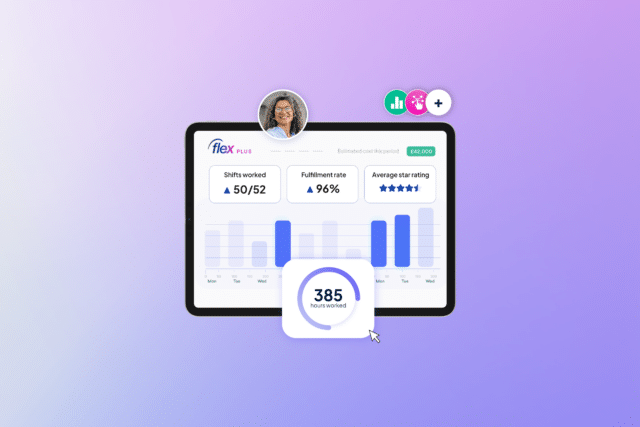
Indeed Flex’s workforce management solution has helped employers seek out the best temporary and part-time staff in their sectors. However, since we began, we’ve come to understand that employers can sometimes get confused about two key terms used in the hiring process – ‘staffing’ and ‘recruiting’.
In this quick guide, we’ll take a closer look at the differences in staffing vs. recruiting. We’ll explain what each process actually entails, when they are used and the type of staff they can help you hire.
What Is Staffing?
The main difference between staffing and recruiting is that staffing is primarily focused on filling short-term vacancies, such as temporary or contract roles. These are often positions that provide support to teams during certain events or seasons, delivering a particular service during a project or providing cover when permanent staff are unavailable or on leave.
Currently, the number of temporary employees in the UK is on the rise, with 1.61 million short-term workers as of June 2021, compared with 1.46 million in January 2020. That means there’s an increasing pool of talented workers to choose from, with hospitality, office and clerical and industrial staff all commonly hired on a short-term basis.
The short-term nature of staffing makes it very appealing for some workers. It gives them more flexibility and control over when and where they work. It also allows them to try lots of different roles and find a working routine that fits around their existing commitments. Organisations that rely on staffing solutions to meet their short-term needs often use an agency or temporary staffing software to find and hire the best staff quickly.
At Indeed Flex, we have a community of 44,000 talented temporary workers and a smart match algorithm that helps you find the best workers for your business. There’s also automated compliance and HR admin to make sure every box is ticked.
What is Recruiting?
If you want to hire employees to fill full-time, permanent positions in your business, then it is the process of recruiting, rather than staffing, that you’ll use. The recruitment process can take a long time as there are several different stages to go through to help you make the right decision.
Typically, recruiting is used to fill higher-skilled roles, which are often longer-term and may require a probation period to be completed before the worker becomes a fully fledged employee. The recruiting process tends to be quite time-consuming and labour-intensive, which is why many businesses choose to go via an agency to find new talent. Agencies will be responsible for creating the job listing, assessing the candidates, conducting preliminary interviews and then providing the employer with a shortlist of the best options.
Alternatively, an increasing number of businesses are choosing to take the temporary to permanent route. This reduces the risk by letting you test a candidate’s skills, knowledge and experience, effectively hiring them on a temporary basis before making any long-term contractual commitment.
When Would I Need a Staffing Agency vs. a Recruiter?
1. Staffing agency
Staffing refers to the steps that are required to fill a position. That includes:
- Finding
- Employing
- Compensating
- Retaining (for similar postings in the future)
In return for providing these services, staffing agencies typically bill their clients an agreed hourly rate for the temporary workers they find.
Staffing is an ongoing process for most organisations, as there is often a consistent requirement for additional resources. It is best suited to situations where a business has to react quickly to unexpected situations while maintaining its efficiency. If we take the hospitality industry as an example, there are several situations when a staffing solution or agency would be the right fit:
- You need waiting staff or caterers quickly for a one-off event
- You want new hires immediately, but lack the resources to recruit permanent employees
- You experience a rise in demand due to seasonality but expect it to return to usual levels after that
- You have to fill several positions due to a restaurant expansion and want to hire temporary staff to bridge your skills gap while you recruit permanent staff
2. Recruiter
Recruiting is a process that suits a different set of requirements. Rather than just placing staff with employers, recruiters are involved from the earliest stages, headhunting candidates and encouraging them to apply for an open vacancy.
The stages involved include:
- Job board posting
- Approaching prospective candidates via social media
- Researching and vetting candidates
- Carrying out preliminary interviews
- Salary benchmarking
- Shortlisting the most suitable candidates for interview
In return for providing these services, recruiters typically charge a percentage of the new hire’s salary as a placement fee. Recruiters tend to take a candidate-first approach, identifying people with a certain skill set and asking them whether they’d like to be part of a particular organisation. That’s in contrast to staffing agencies, which approach a candidate with a role that is clearly defined and needs to be filled.
For staffing agencies, compensation is usually the most important factor when placing the right candidate. In recruitment, there are a lot of other things to focus on. Salary is always important but so is company culture, professional development, personal fulfilment and the candidate’s role within the team. That makes finding the right fit for a position a more difficult process. Scenarios when a recruiter would be the best fit for a hospitality business include:
- A restaurant looking to hire highly-skilled, permanent and full-time employees such as a head chef, sous chef or restaurant manager
- Businesses who are in no urgency to hire and can spend several months finding the right candidate
- Organisations searching for candidates to fill high-level positions in upper management and at C-level who will improve the overall business and its processes
Staffing vs. Recruiting – Finding The Right Fit For You
Once you understand the difference between staffing and recruiting, making the right choice for your business becomes a lot easier.
If the position is short-term and you need one or more workers with specific core skills urgently, then go for staffing. On the other hand, if you want a permanent employee to become a long-term member of your team, then choose recruiting.
Whether you’re looking for short-term staffing or a temp-to-perm solution, Indeed Flex workforce management software can help. It gives you the flexibility to hire temporary staff when and where you need them and makes it easy to control your workforce management operations, giving you the choice of the best quality staff in your sector.
Register your interest in Indeed Flex today and our friendly team will be in touch.








